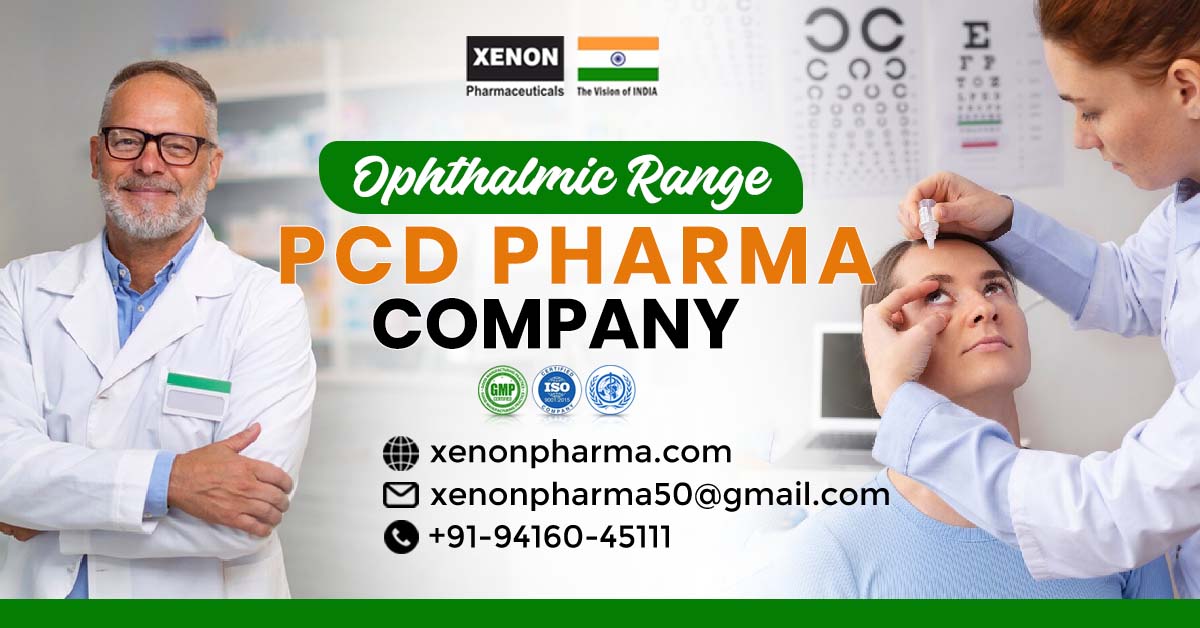The pharmaceutical industry is one of the most regulated industries in the world. Moreover, the ophthalmic product companies are even more regulated than any other pharmaceutical companies in India. Ophthalmic range PCD pharma company in India needs to adhere to strict rules and regulations to ensure product safety, efficacy, and quality. Hence, from licensing to quality control, companies face many challenges in the regulatory environment.
In this blog, we’ll look at the major regulatory hurdles ophthalmic range PCD pharma companies face. More importantly, how companies like Xenon Pharmaceuticals are successfully overcoming them.
What are the Regulatory Challenges in the Ophthalmic Range PCD Pharma Company in India?
1. Consider Required Licensing and Approvals
PCD pharma companies for ophthalmic products need to get several approvals from regulatory authorities like DCGI and the State FDA. And while these approvals grant formulations compliance with safety and efficacy standards, it does not ensure that the formulations are safe and effective. It is a long and documentation-intensive process.
2. Check out Compliance with Good Manufacturing Practices
Regulatory bodies insist that all ophthalmic PCD pharma companies follow Good Manufacturing Practices (GMP) to produce eye drops and other ophthalmic solutions in a sterile, contamination-free environment. And even small deviations from such practices can lead to penalties or product recalls.
3. Product Stability and Packaging Regulations
Ophthalmic products are applied directly to the eyes, so they cannot have any harmful contaminants. Moreover, the reputed companies research their products to make sure they are stable throughout their shelf life. Packaging must be in accordance with regulations such as tamper-proof and sterile to maintain product integrity.
4. Marketing and Ethical Promotion Restrictions
Ophthalmic product promotion and distribution is subject to strict ethical guidelines. In addition, PCD companies also need to follow MCI regulations and should not make false or misleading claims about anything or engage in unethical marketing practices.
5. Import and Export Regulations
Exporting and importing products for doing international business of the company is not an easy task as different countries have different standards, so an eye drops range PCD company in India should design products as per regional regulatory requirements.
How Companies Can Overcome These Challenges
– Ophthalmic PCD pharma companies should hire a dedicated regulatory affairs team to tackle the regulatory challenges. This team will look after all documentation, compliance, and product approvals, thus avoiding legal issues.
– Manufactures must perform quality control checks to ensure the product is safe for use. Therefore, they conduct routine audits and stability tests and maintain a clean, safe environment now to avoid any regulatory problems in the future.
– These days, new innovations such as automated compliance and electronic documents allow the eye drop PCD companies industry to easily comply with regulations that were once difficult to meet. Moreover, these technologies structure the processes, enhance performance and precision, and allow accelerating the overall approval procurement process.
Conclusion
Ophthalmic PCD pharma companies face multiple challenges, but regulatory compliance is one of the biggest hurdles to cross. Moreover, businesses can cross it with the correct approach. In addition, the need for investment in regulatory expertise, quality, and technology has enabled companies like Xenon Pharmaceuticals to flourish despite the headwinds in the space. Hence, by embracing change and focusing on compliance, eye drops range PCD company in India can ensure that their products are safe and effective and ultimately benefit patients around the world.
Frequently Asked Questions
Q1. What are the key licensing requirements for ophthalmic range PCD pharma companies?
Ans. Ophthalmic PCD pharmaceutical companies need approvals from regulators like DCGI, the State FDA, and CDSCO, manufacturing licenses, product registration, and GMP certification.
Q2. Why is GMP compliance so important for PCD companies in the eye drops range?
Ans. Good Manufacturing Practices (GMP) ensure that your eye drops and ophthalmic products are sterile, safe, and effective. Without GMP, you risk product recalls, regulatory fines, or loss of your business’s credibility.
Q3. How does an ophthalmic range PCD pharma company expand in the international market?
Ans. To go global, firms must comply with the regulatory regimes of the countries where they want to operate and obtain the appropriate export licenses. Plus, pharma companies modify product formulations to meet local standards.
Q4. What steps do pharmaceutical companies take to guarantee the quality of their ophthalmic products?
Ans. Extensive testing and stringent quality control measures allow the pharma companies to deliver high-quality services to their clients in need of ophthalmic products. We adhere to GMP guidelines, conduct regular quality control audits, and invest in the most advanced technology available to ensure that our products meet global safety and efficacy standards.
Contact Details:
Company Name: Xenon Pharmaceuticals
Phone: +91-94160-45111, +91-89015-46111
Email: xenonpharma50@gmail.com
Address: 598, M. K. Technology Park,
Landran, Banur Highyway, SAS Nagar, Mohali, Punjab – 140307

